Sheela Raghuwanshi participated in the training on ‘New Extensionist: Changing Paradigms in Agricultural Extension’, organized at IVRI, Izatnagar (UP), from 21 to 30 September. She shares her experiences from the event here.
CONTEXT
The term ‘New Extensionist’ as propagated by GFRAS (Global Forum for Rural Advisory Services) and its regional networks, such as AESA, puts forward a global view of extension and advisory services (EAS) that has re-invented and better articulated the role of EAS in the rapidly changing EAS landscape. EAS have to go beyond production, with a focus on making farming and associated activities profit-oriented just like any other business organization. This calls for changes in the prevailing agriculture scenario so as to meet the new demands that can only be addressed by enhancing the capacities of the extension functionaries. In this context, the training programme, sponsored by the Indian Council of Agricultural Research (ICAR) on ‘New Extensionist: Changing Paradigms in agricultural Extension’ was organized at the Division of Extension Education, ICAR-Indian Veterinary Research Institute (IVRI), Izatnagar (Uttar Pradesh) from 21 to 30 September, 2019. The objective of this programme was to create awareness among the participants on what the New Extensionist is all about, and how learning resources such as NELK (New Extensionist Learning Kit) could be used in capacity development of EAS functionaries.
PROGRAMME
Inaugural Session
The training programme began with the formal inaugural session coordinated by Dr Mahesh Chander, Head, Division of Extension Education, and Joint Director (Acting) of Directorate of Extension Education, IVRI, who was also the Course Director. He spoke on the changing paradigms of Agricultural Extension Education and elaborated on the purpose of training. He called attention to the importance of enhancing the capacities of extension functionaries at different levels so that they can meet the latest demands from farmers as also from the various actors along the agricultural value chains.
In the inaugural address, Dr RK Singh, Director, IVRI, talked about the various challenges in the agriculture sector, where profitability from farming activities is more important than mere productivity. He gave an overview of the prevailing global agriculture extension scenario. He pointed to the importance of secondary and tertiary agriculture where many more activities can be taken up along the value chain to ensure profits from farming, instead of only engaging in primary production of agricultural commodities. This necessitates developing the capacities of extension functionaries in order to meet the evolving challenges in agriculture and allied sectors. He, furthermore, appreciated that such need-based training is being organized at the institute.
SESSION I
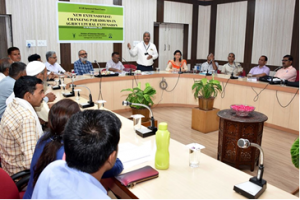 New Extensionist: An Overview
New Extensionist: An Overview
Dr. Mahesh Chander, Head Division of Extension Education and Course Director set the context for this training by providing the background, citing the GFRAS New Extensionist document and various modules of NELK. Complementing it with examples, he explained well why NELK and various modules have become relevant for revamping the efficiency of EAS. The exercise being undertaken by MANAGE and ICAR together to update course curricula in Agricultural Extension at both UG and PG levels with supporting documents was very useful for us, especially when Dr Mahesh Chander gave a detailed overview on this. All of us think that the existing course curricula is outdated but Dr Mahesh Chander offered us a solution to this problem, for which we are all grateful.
SESSION II
Taking field extension services in mission mode: The case of Napier Hybrid promotion among farmers
Dr BP Singh, Principal Scientist (Agricultural Extension), delivered a lecture on the importance of green fodder crop for fulfilling the nutrient requirement of animals, and to improve the status of green fodder availability in Bareilly District. He discussed how green fodder cultivation promotion was taken up in a campaign mode by the extension scientists of the institute. Various activities, viz., lectures, leaflets, demonstrations, exhibitions, radio talks, workshops, interface meetings, hybrid Napier cutting distributions, were used to highlight the importance of green fodder in profitable livestock husbandry. He also showed a beautiful short film on Bajra Napier Hybrid produced by the Extension Education Division and uploaded on YouTube. This was a good experience as it showed how effectively IVRI launched the campaign to promote Bajra Napier Hybrid among farmers. This experience has also been recently published by ICAR as a success story.
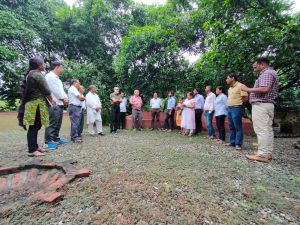
Interaction of trainees with some innovative farmers of Bareilly district
SESSION III
Visit to Kasumara village
Trainees were taken on an exposure visit to Creation Biotech based in Bareilly district, to highlight the importance of extension services in startups, especially with regard to the creation of a new enterprise and export-related requirements and certification, etc. Mr Nihal Singh is a successful agripreneur engaged in certified organic mint production who has organized small scale farmers into a strong group of over 2000 farmers in the district who grow mint for him. He then extracts mint oil through his advanced distillation unit and exports it to several countries in Europe and USA. He also provides value-added extension services to farmers enabling them to grow certified organic mint as per the guidelines and standards for organic production following good agricultural production practices as mandated for export of certified mint oil. He also spoke about the support of several foreign agencies, such as Dr Bronner’s, Fair for Life, GIZ, Soil & More, and Delphi Organic etc., who offer their services and technical guidance under their CSR initiatives.
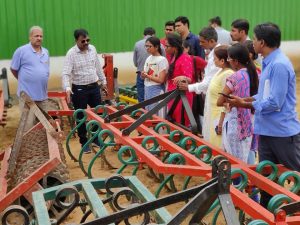 Mr Nihal Singh explaining about improvised farm implements meant for his contact farmers
Mr Nihal Singh explaining about improvised farm implements meant for his contact farmers
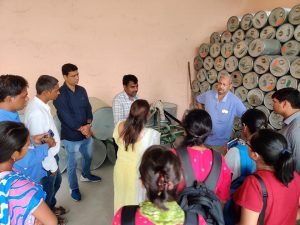
Mr Nihal Singh explaining about processing, packaging for exporting certified farm produce
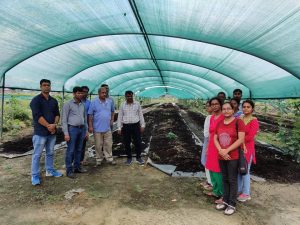
Mr Nihal Singh at his Vermi compost production unit
Trainees got the opportunity to visit their vermicomposting unit, export-oriented organic products, and processing units. Mr Singh also shared his experiences on how as an agriculture science graduate he started his journey and went on to become one of the most successful organic mint oil & essential oils exporter in the country. He also runs his own YouTube channel under the name of ‘Pavitra Menthe’. His story has already been documented by Dr Mahesh Chander as a GFAR blog-Minting Organic Money and the US soap brand Dr Bronner’s, has profiled him in a short film available on YouTube. It was an inspiring case for all of us – how a young man could establish a big agri-venture in such a relatively short time. Also, it set us thinking on whether as extension professionals we are competent enough to cater to the needs of such agripreneurs. We realized we need to improve our own capacities to be of value to such enterprising farmers.
SESSION IV
New tools for Impact Assessment
Dr D Bardhan, Principal Scientist (Livestock Economics, Statistics and Information Technology) delivered a very useful lecture on Impact Assessment, discussing classification of economic impact assessment into ex-ante assessment and ex post evaluation. Ex–ante evaluation of agriculture research projects has become important in recent years for priority setting; ex post impact assessment for learning about generalizability to other populations and contexts. He also described various types of impact, i.e., Quantitative, Qualitative, Direct, Indirect, Tangible, Intangible, Intended and Unintended, including various methods of impact assessment. This lecture was really very insightful considering the importance of Impact Assessment in extension.
SESSION V
Effective teaching tips
Dr Mahesh shared very valuable tips on effective teaching. He aroused the interest of trainees on the importance of effective teaching by sharing various personal experiences. He is a recipient of the ‘Bharat Ratna Dr C Subhramaniam Outstanding Teacher Award’ given by ICAR. His lecture was particularly inspiring as we could gather some practical tips for effective teaching.
SESSION VI
Social media in extension
This session was devoted to Social Media as web-based tools of electronic communication allow users to personally interact with others – individually or in groups – for the purposes of exchanging information, sharing thoughts and opinions, influencing and facilitating decision-making by creating, storing, retrieving and exchanging information in any form (text, pictures, video, etc.) by anyone in the virtual world. Dr Mahesh described how social media has changed the way we communicate, read, search, think, talk, watch, and listen. It is about the sociology and psychology of communication alongside technology. Various social media channels, such as Facebook, LinkedIn, Myspace, WhatsApp, Snapchat, Flickr, YouTube, Blogs, Microblogs (e.g. Twitter, Tumblr), forums, discussion boards and groups, which play an important role in transmitting and conveying information and messages were all discussed with suitable examples.
The discussions were really very insightful since Dr Mahesh had the experience of attending a week-long Social Media boot camp organized at FAO Headquarters in Rome in 2017. Also, he happens to be the ‘Social Media Champion’ at the institute designated under the scheme of Ministry of Human Resources Development, GOI. A Social Media Champion is expected to communicate the good work done by their particular institution and students with others. As such, he is officially responsible for coordinating the Social Media engagements of the institute, which was rather interesting for us. Social media is constantly expanding into the rural areas in the form of various farmers’ WhatsApp groups, on which farmers post their questions and get solutions from peer farmers and other experts. The various challenges in social media applications for agricultural extension were also discussed, wherein participants shared their personal experiences as well.
SESSION VII
Filming and editing videos for documenting success stories
Dr R S Suman, Senior Scientist, IVRI, briefed participants on making and editing videos for documentation of success stories. He explained to us about editing films and videos practically using Window Movie Maker. He shared various tips for movie and film editing in an interesting manner. There is also an alternative available for Window Movie Maker i.e., ‘Filmora9, which supports almost all kinds of video formats, such as AVI, MP4, MPG, MPEG, WMV, etc. Secondly, it boasts of powerful video editing functions such as crop, trim, adjust video effect, and watermark. He elaborated further on the steps for video editing through a flowchart of operation, and practically performed the same in the classroom. The session gave an overview on the transition of Agriculture Extension from traditional to modern – that is dominated by e-Extension and m-Extension.
SESSION VIII
Development of Mobile Apps: IVRI experiences
Dr Rupasi Tiwari, Principal Scientist, I/C ATIC, IVRI, set up the context for the development of mobile apps by providing an overview. She explained the present scenario of mobile apps and how they are so helpful at disseminating relevant information. She listed all the mobile apps developed by IVRI covering different aspects of Animal Husbandry, viz., IVRI-Pashu Prajanan, IVRI-Pig Farming, IVRI- Artificial Insemination, and many more. She spoke of the methods to be adopted for developing farming-oriented mobile apps and supported it with her practical experience of working on apps development in recent years.
SESSION IX
Excellence in extension education teaching: Roles and challenges
In his motivational lecture Dr Shivendra Kumar Kashyap, Professor, Head and Joint Director, Communication at GBPUAT Pantnagar, used an appropriate mix of quotes, interactions and energizers to break the tedium of the day. The most important values that every teacher needs to incorporate in his/her teaching style are: prepare lesson plans for the complete course, believe in the ability to transform every class from sad class to glad class by ensuring total participation of the entire group. His advice was to take interest in students personally, consider students as individuals, and remember their names instead of their roll numbers – all these tips are invaluable. He also stated that engaging MSc and PhD students in teaching undergraduates will be a great help in developing their personality.
SESSION X
Extension intervention for doubling farmers’ income: The case of Uttar Pradesh
Dr PK Mukherjee, Principal Scientist, made a presentation on ‘Extension intervention for doubling farmers’ income: Case of Uttar Pradesh’. Based on his experience of working on the document, ‘Doubling the farmers’ income in Uttar Pradesh’, he threw light on the overall concept and general strategy for doubling farmers’ incomes (DFI) by 2022. He explained various schemes and initiatives of the Central Government of India to achieve targets such as Pradhan Mantri Kaushal Vikas Yojana, Pradhan Mantri Krishi Sinchai Yojana, etc. He also discussed various extension approaches – promoting entrepreneurship by encouraging innovations and working with innovative farmers, working with startups, focusing on value addition, processing, market intelligence, farmer-to-farmer extension, etc., for addressing the challenges for DFI. He briefly illustrated the farming scenario in Uttar Pradesh with regard to various crops, livestock and poultry along with the necessary intervention strategies, and the role to be played by extension functionaries.
SESSION XI
Importance of blog writing
Dr Mahesh Chander delivered another lecture on the importance of dialogue in the present scenario, the farming setup of today, as well as farmers’ aspirations that are evolving rapidly. Since professionals need to re-tool, re-equip and re-acquaint with new knowledge skills, he talked about the necessity of having writing skills for various platforms. Conversation becomes crucial as we believe that these are not merely conversations but voices for change. He shared wonderful tips with the participants on blog writing such as organizing thoughts, using short sentences, short paragraphs, using straight, simple informal words, need for snappy titles, writing in a conversational style, using hyperlinks, etc. Blogs published at AESA, GFAR, YPARD, FAO, and GFRAS platforms were presented as examples on how extension professionals can communicate ideas through blogs. This was something new for us, and worth trying in order to improve our influence in the professional space.
SESSION XII
Field visit to successful agri-ventures
Interactions were organized with various agripreneurs, viz., Opus Poultry Farm, Godson Organic farm, Sehyogi Biotech by visiting their sites. These agripreneurs were amazing and inspiring because they were innovative not only in production practices and processing but also in marketing. We learnt a great deal from them, especially the importance of being innovative and enterprising.We also visited the community radio station and learnt about its functioning. Towards the end of the training programme, we visited the hill campus of the institute at an altitude of 7,500 feet at Mukteswar in Uttarakhand, got a glimpse of mountain agriculture, and the challenges accosting EAS in mountainous terrains.
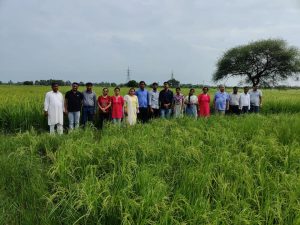
Visit of certified organic rice farm
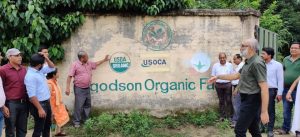 Er Anil Sawhney, certified organic farmer with the Brand Name of his farm-Godson Organic Farm
Er Anil Sawhney, certified organic farmer with the Brand Name of his farm-Godson Organic Farm
Visit to poultry farm
MY IMPRESSION
What I liked in this course
- The various documents published by AESA and GFRAS were shared in hard and soft copies, which were treasure houses of information.
- The proceedings, including the relevant photos of each day, were reported in Social Media professional groups, such as FB page of Agricultural Extension in India.
- It was more practice-oriented rather than merely classroom lectures as we were exposed to several agripreneurs engaged in various ventures who had a lot of practical points to share.
- The approach was informal with least stress, but knowledge intensive.
- The faculties were knowledgeable in their subjects and had prompt answers to our queries, whenever we raised any questions.
For me, this course was a wonderful experience and very effective in improving my ideas on changing paradigms in Agricultural Extension. Finally, I learnt that GFRAS and AESA documents and media resources are freely available and downloadable, and these are very important for extensionists to bring about changes in their functioning. This can also help in improving their capacities to meet the new demands coming from various actors along the agricultural value chains.
One of the participants, Dr Sushant Handage, wonderfully wrapped up the whole training experience in a nice video and uploaded it on various social media channels. This too was a learning experience for most of us – how to document our experience and report it in effective ways. Furthermore, sharing my training experiences in the form of this AESA Meeting Note gives me much pleasure.
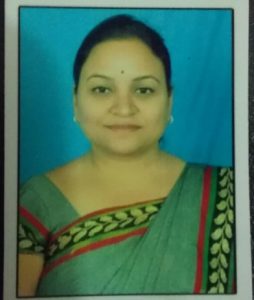
Ms. Sheela Raghuvansi, Assistant Professor, College of Agriculture, Tikamgarh, JNKVV, Jabalpur, Madhya Pradesh. (Email: raghuwanshi.sheela96@gmail.com )


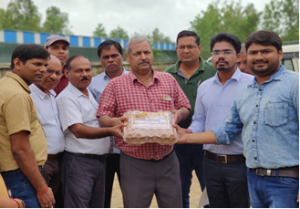

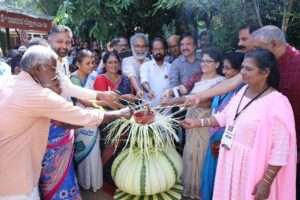

Add Comment